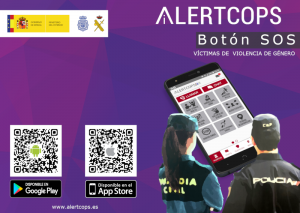This is not an exhaustive guide and is not intended to be one. We have chosen not to include information for the self-employed, businesses nor administrative procedures. We are focusing on the more immediate needs of families. Nevertheless, if you find yourself in a situation not covered in this guide, the Spanish government has provided a link with extensive information. Additionally, there are entities specializing in those areas.
Single parent families

As a general rule, in all social measures, we are included within the “vulnerable” group in a general sense. That is, we are not categorized as a specific collective to which measures are being directed, a situation which allows us to gain access to that with which our family, personal or economic condition corresponds. To have family responsibilities while alone, is being treated as an additional cause of “social vulnerability”.
However, all of the following resources and measures cited could affect and be utilized by single-parent families.
Housing
EVICTIONS - Suspension of all evictions without alternative residence, be it housing with a mortgage or a rental agreement, until 6 months have passed from the end of the state of emergency.
Important: It is highly likely that documentation will be required for this suspension, if the case does arise, and that this is with respect to habitual residence, where being registered at that place would be expedient. Both the necessary social documentation and the “social/economic vulnerability” accreditation (in the case of not being considered as such before the state of emergency) need to be issued by Social Services (professional from Social Work of the social center corresponding to places of residence) .- RENTALS
-
- Six month extension of rental contracts near termination for habitual residences, including its conditions, in order to avoid abusive increases of prices.
Important: It must be communicated, preferably in writing, to the landlord that an extension is wanted. - Residences rented to large owners, normally legal entities. Obligatory: Waiving of monthly rent by 50% during the state of alarm or a maximum of 4 months.
Postponement of 4 months (or state of emergency) of rent. This postponement will be fractionated during the subsequent months: minimum 3 years or termination of contract.
Important: The request can be started through a statement of responsibility to the owning company, but “economic vulnerability” must be proved through documentation - Housing rented to private owners. Voluntary of landlord: Waiving all or part of the debt and/or postponing payment.
Important: If an arrangement is possible, institutions such as the Chamber of Urban Property or other professionals can provide consultation to the owner on the legal procedures. But whether or not there is an arrangement made, keep a written record that an attempt to negotiate an agreement was made. - ICO Microcredits. Interest free loans with government guarantee for payment of rent, maximum 6 months and 10 years for length of repayment. Apply at bank offices. Important: Documentation of “Social Vulnerability” is necessary, and proof of impossibility of other agreements with the landlord is good.
- Rental assistance program. Assistance of 601€ to 900€ per month and up to 100% of the rental cost. And if the case be, up to 100% of the principal and interest of the loan with which payment of the habitual residence’s rent is made. Important: The rules of this measure have not yet been developed, and the Autonomous Communities will need to do so. It will be necessary to await further information regarding its application, applicable dates and periods, and whom is included within “Social Vulnerability”.
- Six month extension of rental contracts near termination for habitual residences, including its conditions, in order to avoid abusive increases of prices.
-
- MORTGAGES - Extension of mortgage payment is given to persons who meet the following four conditions:
-
-
- Have lost their job or, in the case of business owners or autonomous professionals, suffered a loss of at least 70% income or sales.
- Payment of mortgage and basic utilities equals 35% or more of net household income.
- The household income from the month previous to the extension request must not exceed:
- Three times the established Multiplier for the Public Income Index IPREM (1,613.52 €/month) in the case of simple family units.
- Four times the Multiplier for the Public Income Index IPREM (2151.36 €/month) in the case of a family having a member who is dependent or has a disability.
- Five times the Multiplier for the Public Income Index IPREM (2689.20 €/month) in the case of a borrower who has a physical disability, of at least 65%, or mental, of at least 33%; or in cases of serious illnesses which prevent employment.
- It is to be applied for at the corresponding banking entities. It will not charge interest to vulnerable persons and cannot contain any clauses for obligatory insurance, additional services, etc.
-
Important:This measure has a markedly temporal character. If you suspect that you are not going to be able to make mortgage payments for much longer than 3 months, remember that there still exists the possibility of the mortgage debtors protection measures from the Code of Good Practices. To prevent the loss of housing, ask the bank or Social Services for information.
-
BASIC UTILITIES - Electricity, water, gas and telecommunications
- It is prohibited, after April, to have shut off water, electricity, natural gas, and telecommunications (telephone and internet) for all families.
- The application of social tariff is expanded to include those who are now in a situation of vulnerability.
- The social tariff renewal period is extended until September of the current year.
- Postponement of basic utilities payments for autonomous professionals and Small and Medium Companies PYMES is applied. Additionally, adaptation of their contracts to the new consumption levels without penalty.
- Changing of telecommunication companies is prohibited during the state of emergency, as well as the disconnection of said utility for anybody, considered or not, to be in a situation of vulnerability.
- Those who may receive the electric social tariff is extended to autonomous individuals who have stopped their activities or have had a loss of income of more than 75%
Important. Using the energy social tariff would be the most beneficial over time, you can check the conditions and how to do so with this link: https://gestionfamiliar.es/en5pasos
Energy companies such as Naturgy or Iberdrola, allow postponing without interest and paying installments for the months during the state of emergency (only for clients who are in the Free Market). It can be done through their websites.
Credits
Extension of 3 months payment of all types of consumer credit, including credit cards. Apply at the bank.
Important: You must demonstrate “Social Vulnerability”. If you anticipate not being to make your credit payments, as small as it may be, it is important to request this. The commission fee for “debtor position” will be a minimum of 30 €, even if there remains only 1 € to be paid.
Taxes and fees
The majority of local administrations, if not all, have announced extensions and postponements of taxes such as Municipal Property Tax IBI, waste management fees, vehicles, etc.
These postponements are automatic
One way to check is through your city hall’s or council’s webpage.
Important: A postponement, implies just that the charge will occur later, not a waiver, reduction or fractionation. If you see a possibility of not being to pay these fees in their entirety when they are billed, you may request, at the city hall or council where they are collected, a fractionation before the voluntary payment period ends, avoiding late fees, which are always high.
Employment and benefits
In this section we have not gone into great detail so that we may focus on the more immediate problem. To eliminate some important aspects:
1.- The modifications and improvements to the access of benefits and subsidies of unemployment, are exclusively grouped with job loss or reduction from 14/03/2020 onwards, when the state of emergency begins, and are of the same quantity as the current ones.
2.- The administrative time frames for processing benefits or subsidies have been adapted to meet these circumstances which we are experiencing, but it is advisable to avoid delaying the requests if possible.
3.- In the case of Processing Temporary Redundancy (ERTE), it is the company who must include the working persons affected in the application that is processed by the laboral authorities. Seventy percent of the average regulating base during the last 180 days is charged.
In this context, the posible, particular solutions, can be extremely varied, and in case of any doubts, the most recommendable action to take is seek information, although it may not be face-to-face, from the employment services of each Autonomous Community, or from SEPE (State Employment Public Service).
In the case of a conflict with a business, the current laboral legality remains in vigor, and the mechanisms and professionals to carry it out are also.
- Extra subsidy for temporary contract workers
An extra subsidy equal to 80% of the Multiplier for the Public Income Index (IPREM) amount is approved for persons having a temporary contract of at least two months duration, which would have ended after the start of the state of emergency and which doesn’t reach the minimum contribution period to be qualified for unemployment benefits, establishing access requirements based on the incomes of family households. - Domestic workers
An extra subsidy is created for domestic workers who have seen their workdays reduced or their contracts terminated as a consequence of COVID-19. The amount of these benefits is equal to 70% of the regulatory base of the employed. It’s compatible with the maintenance of other activities without, if the case occurs, the total of payment being able to exceed the Interprofessional Minimum Salary amount.- To be active in the Social Security before the 14th of March of 2020.
- Have stopped working temporarily, either completely or partly, in order to reduce the risk of being infected by COVID-19
- Have been terminated due to the COVID-19 sanitary crisis. This aide is monthly and is 70% of the contribution base of the last month. That is, 70% of what has been declared that you pay.
Importante: The employer has to declare in writing the amount, termination, suspension or reduction of hours.
This is done through the SEPE (State Employment Public Service), and the procedures to receive the subsidy are being developed. For the most up-to-date information visit: http://www.sepe.es/HomeSepe/COVID-19/medidas-COVID-19.html
- Rural Employment
The need to attend to seasonal agricultural work has motivated the partial modification of the work conditions of this sector:
Compatibility of part time agricultural work and subsidy due to unemployment, check the conditions using this link.
Conciliation
One of the urgent measures outlined by the government is the right to workday adaptation and reduction.
- If you are employed by somebody, you will have the right to have your workday adapted and/or reduced.
- This is an individual right that must be justified, reasonable and proportional to the situation of the business, particularly in the case if many working persons require this in the same company.
- Both the business and you should do as much as you can to reach a suitable agreement.
- The right to the adapting of the workday may refer to the distribution of time or to any other aspect of work conditions. It may refer to shifts, schedule alterations, flexible schedules, divided or continuous workday, change in work centre, change in functions, change in the form of work of benefits, including the benefit of distance working, or any other change of conditions that may be available at the business or that could be implanted in a reasonable and proportional manner, taking into account the temporal and exceptional character of the measures that are determined by the exceptional period of duration of COVID-19.
- If you need a special reduction of your work which could reach a 100% reduction, you must communicate it to the company with 24 hours notice. This does not imply a change in nature of the effects of the application of rights and guarantees established by the statute for the outlined situation in Article 37.6 (care of minors under 12 years of age, persons with disabilities and close relatives) of the the Workers Statute. In the case of reductions which reach 100%, the right to do so must be justified, and it needs to be reasonable and proportional while taking into account the company’s situation. A 100% reduction of work implies not receiving any wages.
- If you find yourself already enjoying an adaptation of your workday because of conciliation, or a reduction of it because of caring for children, or receiving some of the conciliation rights outlined in the laboral statute, including those established by Article 37, you may renounce it temporarily or you have the right to have its terms to do so modified. The request must be limited to the exceptional period of duration of the sanitary crisis and must be fitting to the specific caretaking needs that you must attend to. And they must be accredited, and must consider the needs of the business. It is assumed that the request is justified, reasonable and proportional, unless otherwise proven to be so.
Important: The particular personal circumstances and interpretation of each business can be almost infinite. Because of this, if you would like consultation for your specific situation, we have a volunteer legal team that will provide consultation, but bear in mind that our resources are very limited and voluntary. You may do so through the following email:
Minors
Canteen grants in order to ensure the basic right to food for children in a situation of vulnerability.
The right to food for children in a situation of vulnerability who are affected by the closure of educational centers is ensured.
When faced with this difficult situation, how should one act around children who are minors?
- Remain calm and manage stress.
- Try to transmit serenity. It’s a serious illness and very contagious but it has a high percentage of recovery.
- Do not ignore that fact this new situation can generate unease and fear in children.
Being at home doesn’t have to be boring
- Perform physical activity like dancing and playing
- Helping with domestic chores, tidying the house, planning meals, stimulating their autonomy and co-responsibility.
- Read, paint, dress-up or sing. In addition to being entertaining, it will stimulate their creativity.
- Maintain family routines and habits, differentiating between weekday and weekend schedules.
- There are didactic resources that can help facilitate this task during times of lockdown: https://www.edex.es/seis-propuestas-para-enriquecer-este-tiempo-de-confinamiento
If you are a single-parent family and have minor under your care, you can go to the supermarket or pharmacy accompanied by them, as long as they aren’t old enough to stay home while you are do so and so long as all the pertinent safe sanitary measures are followed (safe distance, gloves, etc.).
From the 27th of April onwards progressive loosening of lockdown restrictions will be announced, among which will be included a daily walk. At this moment, it is not known what the details are (schedules, time, spaces, etc.), so we will need to be keeping up to date with the new rules.
Social assistance
If you urgently need basic resources, the direct route is getting in contact with the Social Services nearest your place of residence. From there they will provide you with the necessary information and will help you to receive access to assistance: economic, food, rent, utilities, etc.
If you need help to perform daily activities, such as grocery shopping, pets, speaking to somebody, this link may be helpful: https://www.rastreadordevoluntarios.com
Important: Don’t hesitate to turn to public Social Services of your area, if you consider it necessary. That’s what it is there for, it’s where the most immediate help and nearby information can be found.
Immigration
If you are an immigrant and find yourself affected during the initial procedures or renewal of immigration material, these procedures, during the state of alarm, are suspended
However, you have the possibility of submitting electronically the application for the renewal of the immigration authorization. The following link will provide information about the authorizations possible electronically, as well as requirements and steps to follow:
IT IS ESSENTIAL to have a Foreigner Identification Number (NIE), digital certificate recognized by any of the oficial entities of national certification or the electronic DNI (National Identity Document).
- There is a list of the possible electronic authorizations on the webpage we have provided
- If the person doesn’t have a digital certificate, you can authorize the procedure to be done by an administrative agent (her or his digital certificate must be active in the directory of certificates of the College of Administrative Agents).
Gender-based violence
If you are going through a situation of violence, you are not alone, these are the available resources:
- General information and your rights:
Call 016
Send an email:
24 hours a day. 365 days a year. - Legal advice, in 52 languages and with service adapted to situations of disability:
Call 016, from 8:00h to 22:00h, from Monday to Sunday.
TELESOR services: www.telesor.es
SVISUAL videointerpretor services: www.svisual.org - Emotional and psychological support:
Whatsapp: 682916136 and 682508507
- If you have an emergency situation you can call:
112 Emergencies
091 National Police
062 Civil Guard
- When in danger, in case it is not possible to make a phone call, you can use the application ALERTCOPS, from which an alert signal will be sent to the police with your location.
- You can also go to a pharmacy and ask for MASCARILLA 19, and they will call for help.
IF YOU LIVE WITH THE AGGRESSOR: REMEMBER
- You won’t be fined for going out to seek police or legal resources
- If you don’t have another home to go to, there are EMERGENCY AND SAFE CENTERS.
IF YOU DON’T LIVE WITH THE AGGRESSOR
- If you have a protective order and it is being broken, report it, save calls and messages in your phone, or any other proof that it is being broken if you can.
- The service of ATENPRO continues to operate, for both those who had requested it and also for new requests.
The specialized resources and/or associations maintain the protective services for victims of gender violence.
IF YOU HAVE CHILDREN IN COMMON
- If you have custody, you can request the precautionary suspension of visits with the reason of “state of emergency” taking into consideration the risk of infection from the mobility of/to the minor.
- The legal residence where the minors must be during the state of emergency is the residence of the father or the mother who has guardianship and custody.
- In the state of emergency the minors must return to the habitual residence.
- Excepciones de desplazamiento justificado= retorno al lugar de residencia habitual.
- Exceptions of a justified journey = returning to the place of habitual residence.
- Leaving the home according to the normal visiting schedule is not outlined in the current rules, and you can be reported for not following them, although the judicial assessment for each particular case cannot be moved to an earlier date.
IN CASES OF SHARED CUSTODY
- Hay dos domicilios habituales, pero se aconseja permanecer en el que se encontraba el/la menor cuando se declaró el estado de alarma. El tiempo que le corresponda al/a progenitor/a se recuperará en base a un acuerdo interno entre las dos partes.
- There are two habitual residences, but it is recommended to remain where the minor was when the state of emergency was declared. The time owed to the progenitor will be recovered based on an agreement between both sides.
- Taking your children to a Family Meeting Point is not advised, additionally many of them remain closed.
Legislation
The social measures and resources of which we discuss in this guide are found in the following royal decrees of the Government of Spain:
- Real Decreto-ley 8/2020, de 17 de marzo, de medidas urgentes extraordinarias para hacer frente al impacto económico y social del COVID-19.
- Real Decreto-ley 11/2020, de 31 de marzo, por el que se adoptan medidas urgentes complementarias en el ámbito social y económico para hacer frente al COVID-19
- Real Decreto-ley 15/2020, de 21 de abril, de medidas urgentes complementarias para apoyar la economía y el empleo.
Those three royal decrees have been extended by means of diverse resolutions, corrections and general provisions, such as:
- Resolución de 6 de abril de 2020, de la Tesorería General de la Seguridad Social, por la que se modifican cuantías en materia de aplazamientos en el pago de deudas con la Seguridad Social
- Orden TMA/336/2020, de 9 de abril, por la que se incorpora, sustituye y modifican sendos programas de ayuda del Plan Estatal de Vivienda
We understand that throughout the days and/or weeks of the state of emergency, they will be adding regulations and provisions in order to develop all of these measures, in addition to the newer ones being reported and which at the current time have not been developed yet. The latter would be the case of Minimum Rent, progressive loosening of confinement orders of minors or the application of the requests of the new rental assistance.
Some vectors by vecteecy.com


